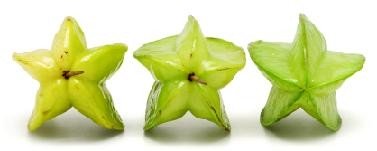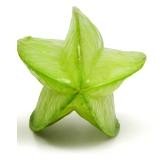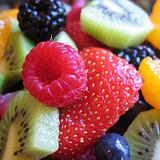Starfruit or Carambola Nutrition,
Health Benefits of Carambola
All about carambola nutrition, carambola benefits, calories in carambola, carambola nutrients
The carambola, yellow/green in color, from Malaysia, has five corners and is also known as starfruit.
With just 31 calories per serving (100g, 3.5oz), it’s a great fruit to include as part of your weight loss regime. In addition it contains no cholesterol and the fat content is extremely low.
The carambola is packed with vitamin C, providing more than half of the recommended daily intake per serving and is therefore thought to be good for boosting our immune systems. It is rich in soluble fiber, giving us healthy bowels and is also believed to help reduce cholesterol. The fruit also contains copper which is thought to help boost the levels of iron in our body, and lutein which helps protect against age related macular degeneration.
According to the US Department of Agriculture (USDA), the Carambola is 91% water. Whilst is contains many other vitamins and minerals, as seen in the table below, the recommended daily intake from a serving (100g or 3.5oz) of the fruit is quite low.
Carambola’s should be purchased at their peak of freshness as they do not last long. Handle with care as they will bruise easily and if not eating straight away, keep them in the refrigerator. They contain oxalic acid, therefore if you have any issues with your kidneys, you should avoid this fruit.
Compare carambola nutrition facts to the other fruits.

Nutritional Value of Starfruit
| Carambola nutritional value per 100 g (3.5 oz) Refuse: 3% (Seeds and stem end) Scientific Name: Averrhoa Carambola |
|
|---|---|
| Proximates: | |
| Water | 91.38 g |
| Energy | 128 kJ (31 kcal) |
| Protein | 1.04 g |
| Carbohydrates | 6.73 g |
| Total Fat: | 0.33 g |
| Fiber | 2.8 g |
| Cholesterol | 0 mg |
| Minerals: | |
| Calcium, Ca | 3 mg (0.3 %) |
| Iron, Fe | 0.08 mg (0.4 %) |
| Magnesium, Mg | 10 mg (3 %) |
| Phosphorus, P | 12 mg (1.2 %) |
| Potassium, K | 133 mg (3 %) |
| Sodium, Na | 2 mg (0.08 %) |
| Zinc, Zn | 0.12 mg (1 %) |
| Copper, Cu | 0.137 mg (7 %) |
| Manganese, Mn | 0.037 mg (2 %) |
| Selenium, Se | 0.6 mcg (1 %) |
| Vitamins: | |
| Vitamin C | 34.4 mg (57 %) |
| Thiamine (Vit. B1) | 0.014 mg (1 %) |
| Riboflavin (Vit. B2) | 0.016 mg (1 %) |
| Niacin (Vit. B3) | 0.367 mg (2 %) |
| Pantothenic acid (B5) | 0.391 mg (4 %) |
| Vitamin B6 | 0.017 mg (1 %) |
| Folate (Vit. B9) | 12 mcg (3 %) |
| Vitamin A | 61 IU (1 %) |
| Vitamin E | 0.15 mg (1 %) |
| Percentages are relative to US Recommended Daily Intake (RDI) for adults. | |
Author: Lana Soko
You Might Also Like:
Like This Page?
|
Share This Page:
|







